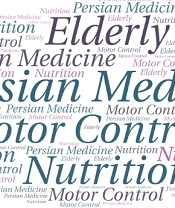1. Context
Sarcopenia, the age-related loss of muscle mass and function, poses significant challenges in geriatric medicine (1). A healthy lifestyle, including exercise and proper nutrition, is crucial for preventing and managing this condition (2). Avicenna, a prominent figure in Persian medicine, emphasized healthy living and provided detailed instructions for the elderly (3). As we delve into Avicenna's teachings, we aim to explore his recommendations which would be attributed to motor control in the context of preventing age-related sarcopenia. By examining Avicenna's insights through the lens of modern research, this review aims to evaluate the potential effectiveness of his recommendations in preserving and improving motor control in the elderly population. By bridging the wisdom of Persian medicine with contemporary knowledge, we can potentially uncover valuable strategies to enhance motor control and mitigate the impact of age-related sarcopenia on the elderly. This review aims to evaluate the potential effectiveness of Avicenna's recommendations in preserving and improving motor control in the elderly population.
2. Methods
A systematic search was conducted in electronic databases, including PubMed, Google Scholar, and academic journals, using relevant keywords such as “Avicenna," “Persian medicine," “Canon of Medicine," “aging," “instinctive heat," and “essential body moisture." The search aimed to identify studies and articles that discussed Avicenna's recommendations for individuals over 65 years old and their relationship to the decline in instinctive heat and essential body moisture associated with aging. Studies and articles that focused on Avicenna's recommendations for individuals over 65 years old and their connection to the decline in instinctive heat and essential body moisture were included. Only articles published in English were considered. Studies that did not meet the specific research objectives or lacked relevance were excluded.
3. Avicenna's Recommendations
Avicenna suggested specific instructions to maintain instinctive heat and essential body moisture (4). Avicenna emphasized the importance of a balanced diet consisting of fresh fruits, vegetables, lean proteins, and whole grains. He recommended consuming foods rich in essential nutrients, vitamins, and minerals to support muscle health and overall well-being Avicenna recognized the significance of protein for maintaining muscle mass and strength (5). He advised consuming sufficient amounts of high-quality protein sources such as lean meats, legumes, and dairy products to support muscle growth and repair. Physical activity recommendations varied based on an individual's physical condition, ranging from walking and horseback riding to lifting and throwing stones (6). Avicenna also advocated for moderate massage using moisturizing and strengthening oils, such as violet oil and rose oil, especially before exercise. Avicenna utilized various herbal remedies to support physical health which would possibly enhance motor control. He recommended the use of specific herbs and plants, such as ginger, turmeric, and garlic, known for their anti-inflammatory and antioxidant properties, to reduce muscle inflammation and promote optimal muscle function. Additionally, he emphasized the importance of sufficient sleep, proper bathing, and reducing mental stress, particularly feelings of sadness which all are effective in optimal motor control in elderly population (2, 7).
4. Comparison with Current Research
Comparing Avicenna's recommendations with recent research on age-related sarcopenia reveals significant overlap. Studies highlight the importance of milk and meat in the elderly diet, aligning with Avicenna's suggestions. For example, a study by Smith et al. found that dietary omega-3 fatty acid supplementation, which can be obtained from fish and meat, increased the rate of muscle protein synthesis in older adults (8). Similarly, a meta-analysis by O'Connor et al. concluded that total red meat intake does not negatively influence cardiovascular disease risk factors in the elderly (9). These findings support Avicenna's emphasis on the consumption of milk and meat for maintaining muscle mass and function. Avicenna's recommendation of goat or donkey milk is also supported by recent research. Goat milk has been shown to have higher levels of certain nutrients, such as calcium and vitamin D, compared to cow milk (10). Avicenna's emphasis on physical activity aligns with current recommendations for preventing sarcopenia. The American College of Sports Medicine (ACSM) recommends a combination of resistance training and aerobic exercise for older adults to maintain muscle mass and function (11). Avicenna's recommendations for physical activity, such as walking and lifting stones, can be considered as forms of resistance training and weight-bearing exercises.
5. Conclusions
Avicenna's views on lifestyle recommendations for the elderly provide valuable insights into preventing age-related sarcopenia and improving motor control. His emphasis on proper nutrition, physical activity, massage, and stress reduction aligns with current research in the field. Incorporating Avicenna's recommendations into geriatric medicine may lead to improved outcomes for elderly individuals at risk of sarcopenia and motor control issues. Further intervention research is warranted to explore the mechanisms underlying Avicenna's recommendations and their potential impact on sarcopenia prevention and management, as well as motor control improvement. By combining Avicenna's wisdom from Persian Medicine with modern scientific knowledge, healthcare professionals can provide more comprehensive and effective strategies for preventing and managing age-related sarcopenia and improving motor control in the elderly. While these studies do not directly cite Avicenna's teachings, they highlight the importance of exercise and lifestyle modifications in improving motor control and reducing the risk of falls in the elderly, which align with Avicenna's recommendations.
